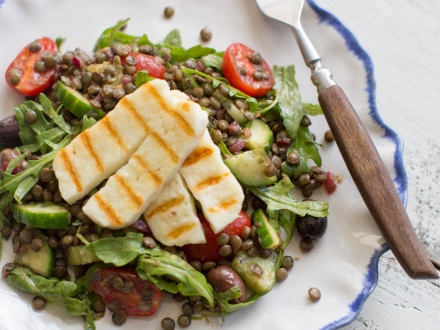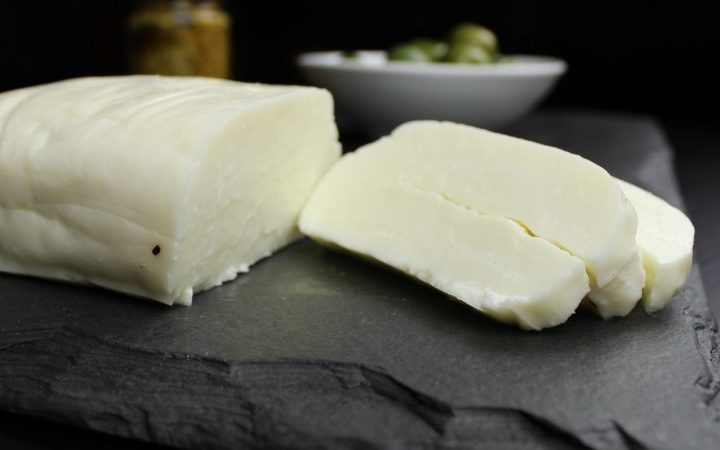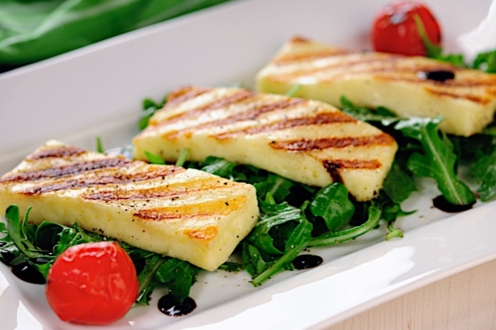The Agriculture Ministry is preparing an ambitious scheme to increase the production of goats and sheep milk by genetically enhancing livestock to meet a spike in demand for Cyprus’ squeaky cheese.
Demand for goats’ milk will radically increase when Cyprus’ traditional cheese is officially registered as a Protected Designation of Origin (PDO) foodstuff with the European Union.
UK Halloumi lovers are already concerned over a shortage caused by the implementation of the designation.
The PDO file description sees a significant increase in the percentage of goat milk to be used for the white cheese, which will see farmers short of livestock.
Cypriot producers will have to find ways to drastically boost goat’s milk, as the PDO file Cyprus submitted dictates that ‘traditional’ halloumi should comprise 51% sheep and goats’ milk and 49% cow’s milk.
At present – in what is a transitional period – 80% cow’s milk and 20% sheep and goats’ milk is required.
While committed to overcoming complexities surrounding the PDO file due to the inclusion of the Turkish Cypriot version of the cheese in the application filed with the European Commission, the Agriculture Ministry has also vowed to support farmers and breeders in increasing milk production.
To accommodate the need for goat and sheep milk the government is to set up an innovation and research centre promoting technological solutions and advancements in genetic science in agriculture and stock raising.
Ministry official Sokratis Sokratous assured the government is seeking ‘solutions’ to the issue regarding the political aspect of the file.
He told the Financial Mirror that they are also looking into other challenges such as the increase in needs of goat’s milk by genetically enhancing goats.
“A centre of excellence is to be established by the government as part of the EU research program Agricygen to promote the stock breeding of goats and sheep, by improving their genetic capacity to produce milk, while also improving the quality of animal food and protecting Cyprus grazing fields”.
Sokratous said while producing milk of excellent quality, Cypriot goats and sheep produce far less milk on average than other similar breeds.
Genetic enhancing
“The Chios Sheep, which is a breed close to the Cyprus sheep produces on average 250 litres a year, while Cyprus sheep produce an average of 130 litres. We aim to enhance production by genetically enhancing local sheep and goat livestock.”
The Agricygen program envisages a 50% increase in sheep and goat milk production by 2027 and an 18% increase in the production of halloumi, with revenues from halloumi exports increasing by €33.6 mln annually.
Increased production of sheep and goat milk by at least 50% by the end of the seven years, corresponds to 17,510 tonnes of extra sheep and 15,450 tonnes of extra goat milk compared to 2017.
“The extra milk will be channelled to the production of halloumi and will result in an increase of 18% (4,984 tonnes) of halloumi exports compared to 2017 and a consequent increase in export earnings by €33.6 million per year”.
The aim is to increase the livestock’s milk-producing capacity by keeping the most productive animals on the line of production and removing the least productive ones while encouraging the breeding of the most productive ones.
This would need the employment of high-tech equipment which monitor the livestock and make suggestions regarding a given animal’s production capacity.
Part of the program is also research on how to enhance the quality of animal food and the ground on which the animals graze.
The program will be under the auspices of the Department of Agricultural Studies with a budget of €1 mln each year for the next seven years. The program has already been approved by the cabinet.
The program is planned to kick-off in 2020 if the ministry can prove that it has saved enough to cover the 2020 budget, as the program was not included in the state budget presented on Friday.
However, the Ministry feels confident that the money is available, and the project will begin as of January.
The program had initially been funded by the EU in its initial stages through the ‘TEAMING’ project within the Horizon 2020 but was not considered eligible for further funding as it lost its place to other EU projects.
Horizon 2020 is the biggest EU Research and Innovation programme with nearly €80 billion of funding available over 7 years (2014 to 2020).
Production shortage
Welcoming the government’s plans to actively enhance goat and sheep milk production, the Cyprus Dairy Producers Association feels the state should have been doing more to support stockbreeders.
“The state should have come forward with such programs much earlier to support farmers and accommodate the ever-growing need for goat and sheep milk, especially for Halloumi products,” said Andreas Andreou, secretary of the Association.
Andreou said that difficult times are ahead as the current rate of goat and sheep milk production is not expected to suffice to cover needs that will be created with the approval of the PDO file which will see halloumi being made from at least 51% goats and sheep milk.
“As things stand today, we have grave difficulties in covering the needs for Halloumi production. Currently, we apply a 20-80% goat-sheep to cow milk ratio. As of 2024, we will be obliged to apply a ratio of at least 51-49%,” said Andreou.
He said the annual production of sheep and goats’ milk is about 60 million litres of which 10 million litres are used for other dairy products.
“This leaves just 50 million litres for halloumi production, which means 100 million litres (when the 49% cow’s milk is added) would be needed”.
This suggests that under the final specifications, production would shrink by more than 50% and so would annual revenue.
As confirmed by the Ministry of Commerce data, total income generated from halloumi exports reached €197 mln in 2018, while exports until June this year have generated €136.
The Dairy Producers Association expect to see the figure reach a record €200 mln this year, while the target set by the Commerce Ministry is for exports to generate €300 mln yearly by 2023.
“This will all depend on the availability of raw materials, in this case, milk,” said Andreou.
The Association’s concerns are echoed in the UK where Halloumi lovers appear to be worried about a shortage of their favourite Cypriot cheese if the EU adopts stricter criteria in its attempt to give the product protected status.
The Daily Mail said that Britain is the biggest market for halloumi buying 40% of exports.
According to the UK media, new rules state that milk used in the production of Halloumi must come from goat and sheep of certain breeds native to the island.
“But local herds are still suffering from a cull after an outbreak of scrapie a decade ago,” noted the Daily Mail.
According to the paper, head of the Dairy Producers Association George Petrou said farmers would also have to ensure their sheep, goats and cows graze on five specific plants – but three of them are protected.
Asked to comment on reports in the UK, Andreou confirmed contradictions in the PDO file, noting that these are just the technical problems of the file, noting that the real problem has to do with farmers capacity to produce the necessary milk quantities.










